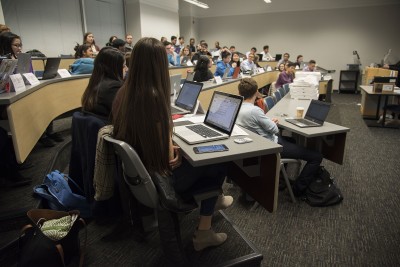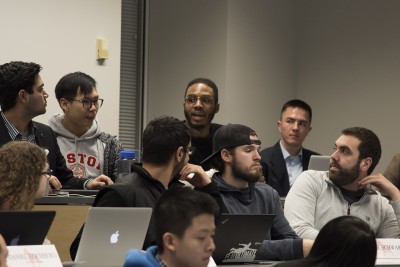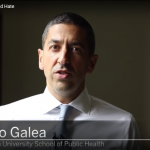
The Boston University Student Government gathered Monday night at its Senate meeting and reviewed upcoming programs and initiatives, including the inaugural Gender Advocacy and Progress Week and a proposal that aims to increase the visibility of water bottle refilling stations.
GAP Week will take place between March 14 and 19 with the mission to “empower our community to diminish the gender gaps that strip human rights across every field,” according to the GAP Week website.
SG Vice President of Internal Affairs Yasmin Gentry said she hoped social media would help generate interest in as many people as possible to participate in GAP Week. By using the hashtag #filltheGAP, people can share stories and experiences of gender inequality as well as thoughts about GAP Week, Gentry said.
“GAP Week is reaching beyond our campus,” Gentry, a senior in the College of Communication and one of GAP Week’s executive coordinators, said during the meeting. “We are hoping to involve alumni and the community. There are so many different events. I’m excited … that [it] involves so many different groups. Many of the groups are finding ways to look at gender equality through their own professions.”
Gentry and Mim Eiben, another executive coordinator of the program and a sophomore in the Questrom School of Business, introduced GAP Week to the student body during an information session in the fall, The Daily Free Press reported Nov. 12, 2015.
During the meeting, SG Director of Environmental Affairs Paige Callahan presented a proposal that requested a $3,000 fund to create and distribute signs indicating the whereabouts of the water bottle refilling stations. A motion to reduce the fund to $1,500 passed with 30 votes for the amendment and one abstention.
Callahan, a senior in Questrom, said BU is trying to be more environmentally friendly in different ways. Including these signs on designated stations will make students more inclined to use refillable water bottles, Callahan added.
“We want to try to reduce the use of plastic water bottle use on campus by increasing the number of hydration stations on campus and making them more accessible,” Callahan said after the meeting. “These signs will be up for sure by the fall semester.”

Senate Chair Courtney Bold also went over the Cultural Sensitivity Training that happened last week and asked senators for feedback.
Most senators commented during the meeting on the important lessons they had learned from the training, though some wished the training would have been held earlier in the year.
“We opened a lot of senators to other viewpoints,” Bold, a senior in Questrom, said following the meeting. “Everyone was amazed to see how diverse we are, even [within Senate]. It was a great start in helping senators understand other people’s standpoints.”
Vice Senate Chair Daniel Collins updated senators on the progress of TurboVote, a program SG funded and approved during its Senate meeting Jan. 25, The Daily Free Press reported Jan. 26. By the time the Senate meeting began, only 46 users had signed up for the free voting service, Collins said.
A few senators expressed their excitement for GAP Week and how they felt about the previous week’s Cultural Sensitivity Training.
Zachary Treichel, a College of Arts and Sciences senator, said students are supportive because they are already getting tickets to discussions and conferences held during GAP Week.
“It’s a great initiative to raise awareness about the issue of [gender inequality],” said Treichel, a sophomore in CAS. “The different conferences and meetings will have a great turnout. Some already are sold out. This speaks to how successful the week will be, [and] that’s really impressive.”
Samantha Day, a College of General Studies senator, said she learned how important it is to recognize and respect other people’s opinions during Cultural Sensitivity Training.
“It would really beneficial to have [Cultural Sensitivity Training] at the beginning of the year,” said Day, a freshman in CGS. “Senators should have more training because it’s very valuable. Plus, I enjoy getting to know [the senators] on another level. Being able to put yourself in other people’s shoes helps give you a better understanding that your opinions could be different than other people’s opinions.”














